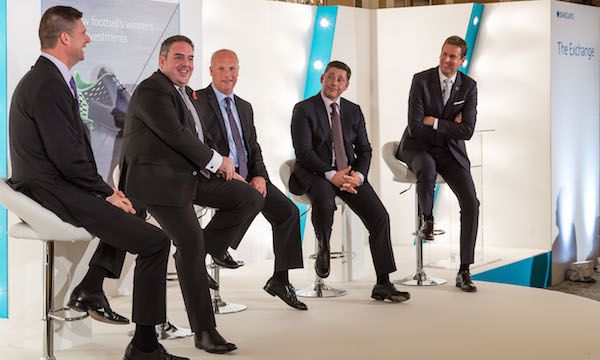

The importance of active investment management for financial success in the football industry was the topic of Barclays’ panel debate, ‘The Exchange’ in Guernsey.
Barclays investment specialists Henk Potts and Nick Gordon were joined by former Sunderland AFC Chairman Niall Quinn and former Southampton FC Executive Chairman Nicola Cortese, with Sky Sports presenter Ed Chamberlin moderating, to debate their thoughts on effective investment management and how it is increasingly a challenge to turn success into long-term prosperity in the football industry.
Despite the fact that there has never been so much money in football many clubs and players that have been successful on the pitch are far less successful when it comes to managing their money.
XPRO, a UK-based football charity which offers help, support and advice to former professional footballers, estimates that three out of five premier league football players go bankrupt after retirement and many of the world’s richest clubs are struggling to manage their financial affairs.
In light of this the panel discussed the need for the football industry to develop smart business and investment strategies to take advantage of the opportunities and navigate the challenges that come with the wealth made by some clubs and players and how these could be applied to other industry sectors.
The panel highlighted the financial challenges facing the football industry including its international nature which requires an understanding of international financial markets and the changing global dynamics.
“Football is an international business and that creates problems for clubs including the issues of negotiating across borders and fluctuating exchange rates,” said Nicola Cortese.
"Players have a performance driven career and a complex lifestyle which can involve playing abroad at some stage of their career. This means operating in an international market and an understanding of the macroeconomic climate and currency markets is vital for their financial success.
“Education is key and clubs have a role in ensuring that players have the necessary knowledge and skills to be successful in their careers and in the future.”
For players in particular Niall Quinn emphasised the importance of a good education to enable them to manage their money.
“Many players, who come into the game at a young age, are not equipped to deal with their wealth. They can be easily influenced which often makes them the target for bad advice and bad decision making.”
Niall drew on his own experiences as a former Irish international to explain the emotional impact of retirement for players.
“When the stadium lights go off and the roar of the crowd dies down many players aren’t prepared and it can be hard for them to handle. They have been told their whole lives they are set for stardom and all of a sudden it ends. We need players to understand the importance of forward planning and preparing both financially and psychologically.”
Henk Potts noted the importance of creating a long term financial plan with set goals so footballers can support themselves and their families after their careers have ended.
“Footballers earn a lot of money at the start of their careers and for a young player who is suddenly massively cash-rich they might not be worrying about the end of their career but it is so important to lay the foundations of a strong investment strategy early on.
“Players need to be aware of the numerous investment options available and their investment goals, as well as the potential benefits balanced portfolios can provide with regard to diversification of investment risks.
Nick Gordon discussed the significance of incorporating a degree of flexibility when creating a financial plan, as both players’ and clubs’ situations will change over time.
“The most important thing is to step back and plan for the future. You not only need to possess the skills to formulate a robust and dynamic plan, but the discipline to actually implement, review and revise it as circumstances and objectives change.
“Working with the right advisors and partners in the long-term can support this, ensuring you have the right plan in place to meet ever changing financial and lifestyle goals. This is not only true for football players and clubs, but for anyone looking to secure their financial future.”